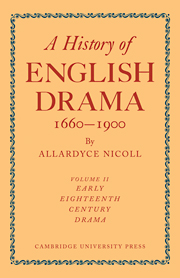Book contents
Summary
Introductory
If, in dealing with the drama of the Restoration period, it was noted that that subject, when compared with Elizabethan theatrical productivity, had been comparatively neglected, it may be said that the drama of the years which followed, from 1700 onwards to the middle of the nineteenth century, had been almost entirely forgotten by scholars and critics. Sir A. W. Ward, progressing further than most, brought his dramatic history to a close with the year 1714; Nettleton has hurried rapidly over these years of “decay” and of “disintegration”; Genest has presented a selection of dramatic performances from 1660 to 1830; a few individual writers have touched upon minor aspects of the theatre of the time; but no one has ever attempted to analyse in anything like fullness the whole dramatic productivity of the age, from Cato and The Conscious Lovers to the flimsiest of pantomimes and the silliest of Italian operas.
A period of decay and disintegration it was in many ways. Sentimentalism, during the first half of the eighteenth century, was steadily gathering way and banishing laughter from the stage. Classicism, imported from France, was slowly driving out the more natural expression of true emotion. Pantomime was usurping the attention of the playgoers and vitiating their taste for higher forms of comedy and of tragedy. Italian opera succeeded in breaking down the desire for more legitimate drama.
- Type
- Chapter
- Information
- History of English Drama, 1660–1900 , pp. 1 - 50Publisher: Cambridge University PressPrint publication year: 1952



